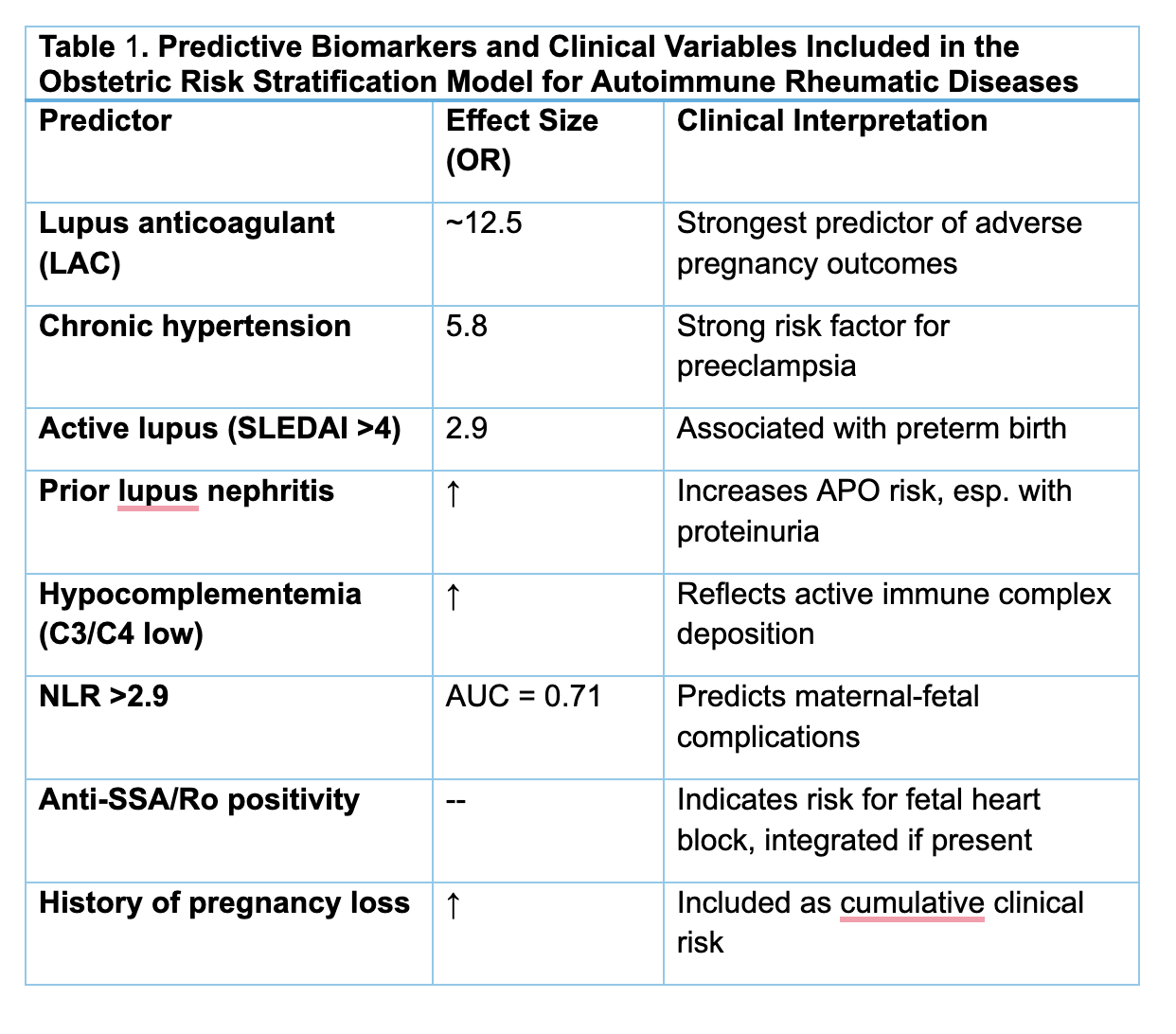Session Information
Date: Sunday, October 26, 2025
Title: (0210–0232) Measures & Measurement of Healthcare Quality Poster I
Session Type: Poster Session A
Session Time: 10:30AM-12:30PM
Background/Purpose: Autoimmune rheumatic diseases (ARDs) such as systemic lupus erythematosus (SLE), antiphospholipid syndrome (APS), rheumatoid arthritis (RA), and Sjögren’s syndrome significantly increase the risk of adverse pregnancy outcomes (APOs), including preeclampsia, fetal restriction (intrauterine growth restriction (IUGR)), fetal loss, and preterm birth. Traditional risk factors do not fully explain these complications. We aimed to develop and validate a predictive model for obstetric risk stratification in pregnant women with ARDs, using a systematic review and meta-analysis of over 150 studies.
Methods: We conducted a systematic search across PubMed, Embase, Web of Science, and Scopus, selecting studies that evaluated biomarkers and clinical predictors of APOs in pregnant women with ARDs. Key variables included lupus anticoagulant (LAC), anti-β2GP1, anti-cardiolipin, complement activation (C3/C4, sC5b-9), neutrophil-to-lymphocyte ratio (NLR), anti-SSA/Ro antibodies, disease activity indices (SLEDAI, DAS28), and clinical history (nephritis, chronic hypertension, prior fetal loss). Data from eligible studies were pooled using random-effects meta-analysis. Predictive weights were assigned to variables based on odds ratios and integrated into a point-based risk calculator.
Results: The model incorporates 12 high-evidence predictors. LAC conferred an OR of ~12.5 for APOs >12 weeks; chronic hypertension an OR of 5.8 for preeclampsia; and active lupus an OR of 2.9 for preterm birth. The presence of nephritis and low complement levels significantly increased APO risk. NLR >2.9 yielded an AUC of 0.71 for predicting maternal-fetal complications. Each variable was scored to produce a cumulative risk score, stratifying patients into low, moderate, or high-risk categories. Internal validation showed a sensitivity of 81% and a specificity of 74% for predicting APOs. (Table 1)
Conclusion: We developed a robust, evidence-based calculator that stratifies obstetric risk in pregnant women with ARDs. This tool integrates clinical, serologic, and inflammatory markers and has potential to guide early interventions and personalized monitoring. The model is currently under academic licensing and not yet publicly available. Future prospective validation is planned to support clinical implementation.
To cite this abstract in AMA style:
Macias-Segura N, Martinez-Canales R, Avalos-Garcia B, Ortiz-Rios A, Galindo-Calvillo E, Salinas-Carmona M, Perez-Barbosa L, Galarza-Delgado D, Skinner-Taylor C. Development of a Predictive Tool for Obstetric Risk Stratification in Autoimmune Rheumatic Diseases: A Meta-Analysis-Based Model [abstract]. Arthritis Rheumatol. 2025; 77 (suppl 9). https://acrabstracts.org/abstract/development-of-a-predictive-tool-for-obstetric-risk-stratification-in-autoimmune-rheumatic-diseases-a-meta-analysis-based-model/. Accessed .« Back to ACR Convergence 2025
ACR Meeting Abstracts - https://acrabstracts.org/abstract/development-of-a-predictive-tool-for-obstetric-risk-stratification-in-autoimmune-rheumatic-diseases-a-meta-analysis-based-model/

